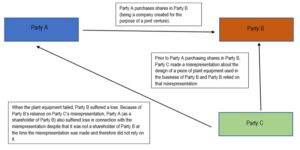Why Third-Party Reliance May be Sufficient for an Entitlement to Damages
Misleading or deceptive conduct is a broad-spectrum cause of action that frequently arises in the practice of commercial litigation.
Where a third party relies on misleading or deceptive conduct, and another party suffers loss and damage because of that third party’s reliance, the party that suffered loss and damage may be entitled to damages.
This article considers the above issue in brief.
What is misleading or deceptive conduct?
Section 18 of the Australian Consumer Law (the “ACL”), being Schedule 2 to the Competition and Consumer Act 2010 (Cth), relevantly provides that “a person must not, in trade or commerce, engage in conduct that is misleading or deceptive or is likely to mislead or deceive.”
The provision is broad and captures a wide array of conduct as a result. This can include false representations about the quality, nature, origin, or price of a product, as well as misleading advertising, warranties, or claims about consumer rights.
It is important the conduct, said to be misleading or deceptive, occurs in trade or commerce, lest it falls outside the ambit of section 18.
Conduct will be misleading or deceptive if it induces or is capable of inducing error1. It need not involve any degree of moral turpitude or trickery2, and does not require any lack of reasonable care.
Further, the fact that a person might have discovered a misrepresentation, had he or she made proper enquiries, does not absolve a party from liability under a claim for misleading or deceptive conduct3.
Who can claim damages?
Section 236 of the ACL provides that:
(a) if a person (the “Claimant”) suffers loss or damage because of the conduct of another person; and
(b) the conduct contravened a provision of Chapter 2 or 3 of the ACL (including the prohibition against misleading or deceptive conduct under section 18), the Claimant may recover the amount of loss or damage by action against that other person, or against any person involved in the contravention.
It is important to consider the effect this has on parties who may have a claim of misleading or deceptive conduct against a company, including whether the director of the company was ‘involved’ in the contravention of the ACL.
To complicate matters, there may be circumstances in which a party has suffered loss in connection with another party’s misleading or deceptive conduct relied upon by a third party (not the party that suffered the loss and damage).
The BHP Coal Case
In the case of BHP Coal Pty Ltd v O & K Orenstein & Koppel AG (the “BHP Coal Case”)4, the Court considered a claim of misleading or deceptive conduct in circumstances where:
- representations were made about the design for modifications to a large excavator built for a coal mine;
- the excavator suddenly collapsed in the year 2000 because of a design failure; and
- the plaintiffs were members of a joint venture which suffered considerable losses as a result of the collapse.
Relevantly, the seventh plaintiff in the BHP Coal Case had no knowledge of the conduct said to have been misleading or deceptive because it was not a party to the joint venture at the time of the modifications. However, in 2000, at the time that the excavator collapsed, the seventh plaintiff had a 4.59% interest in the joint venture.
Further, the seventh plaintiff did not claim to have acted in some way, or refrained from acting in some way, in reliance on the misleading or deceptive conduct.
Despite the above, the Court found that the connection between the representations about the modification designs and the loss suffered by the seventh plaintiff were relatively close. The seventh plaintiff was awarded damages for misleading or deceptive conduct.
The below diagram illustrates the relevant nexus between the parties:

The BHP Coal Case demonstrates the Court’s willingness to award damages for misleading or deceptive conduct in circumstances where the Claimant has not been directly misled but has nonetheless suffered loss and damage because of the misleading or deceptive conduct.
Conclusion
A potential claim of misleading or deceptive conduct commonly arises in commercial disputes. Sometimes the party who suffered loss and damage is not the party who relied upon the misleading or deceptive conduct.
In those circumstances, section 236 of the ACL enables damages to be awarded to the party that has suffered the loss in connection with the misleading or deceptive conduct relied upon by another (provided that there is a close connection between the loss and the misleading or deceptive conduct).
It is important to recognise the affect the BHP Coal Case has on potential claims for misleading or deceptive conduct.
If you need legal advice about misleading or deceptive conduct please contact Sajen Legal for a confidential discussion about how we may be able to assist.
- ACCC v TPG Internet Pty Ltd (2013) 250 CLR 640; Parkdale Custom Built Furniture Pty Ltd v Puxu Pty Ltd (1982) 149 CLR 191.
- Sharp v Cossack Pearls Pty Ltd [2011] FCA 1477.
- Neilsen v Hempston Holdings Pty Ltd (1986) 65 ALR 302.
- [2008] QSC 141.
Tagged in: Competition And Consumer Act 2010, deceptive conduct, misleading conduct

